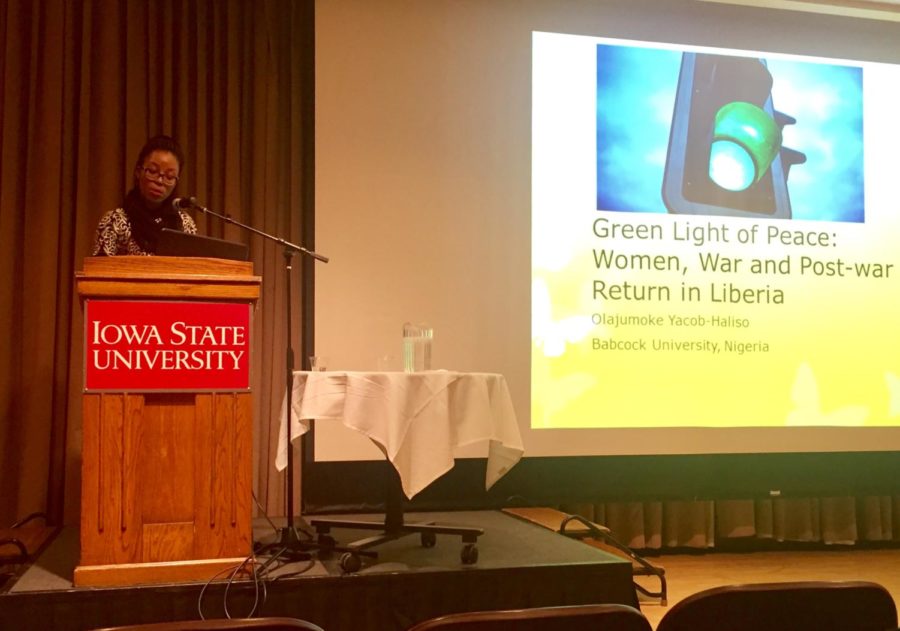Political scientist Olajumoke Yacob-Haliso discusses female Liberian refugees
November 13, 2017
Political scientist, scholar and professor, Olajumoke Yacob-Haliso has done extensive research on Liberian refugees and women. Currently a professor at Babcock University in Nigeria, Yacob-Haliso presented her findings at Iowa State on Monday evening.
According to the lecture, refugees are often misunderstood and women returning home after a war are often overlooked. The idea of home is usually what calls refugees back to their country of origin, when in reality the home they once knew is no more.
To understand the research, Yacob-Haliso presented a short history of Liberia. It is located in West Africa that was created by freed African-American slaves that were sent back to Africa in 1822 and the Republic of Liberia was formed in 1847.
Over time, tension formed between American-Liberians and indigenous Liberian people. This lead to a period that spanned over 14 years of civil wars.
According to Yacob-Haliso, this caused approximately 75 percent of the Liberian population to be displaced and the entire infrastructure to collapse. There was very little electricity and roads were virtually nonexistent except for the metropolitan area.
Many government organizations were commissioned to work in rebuilding Liberia. But Yacob-Haliso was fascinated by the people affected by the war, not the buildings.
“The idea was given to me by a woman I interviewed. When refugees heard from family and friends that the war had ended it was like a bright, green light to [go] on with your life,” Yacob-Haliso said. “Because they basically had stopped living and were just surviving.”
Yacob-Haliso spent time in 2006, 2009 and 2016 meeting with women and networks to understand their experience as refugees. Her findings led her to three main points in her research.
First, the illusion of home creates nostalgia and it becomes easy to forget the negatives of the war. Second, this idea of home is shaped by very personal experiences. Third, external agents should not victimize refugees.
After returning home, children went back to school, businesses were rebuilt and international students were able to study in Liberia once again.
She also urged the understanding that refugees have little say in their experiences. More often than not, as soon as the war ends, reintegration is pushed by refugees’ regimes. This leads refugees to allow external agents to pursue reconstruction as they become acquainted with their, now unknown, surroundings.
“No one chooses to be a refugee, they are compelled to flee due to human rights abuses,” Yacob-Haliso said. “Everyone is a foreigner somewhere. Refugees did not know they would become refugees.”
In her interviews with women, Yacob-Haliso was careful not to use the word home. However, almost all of the women used home to describe their country of origin and associated “home” with peace.
Last week, Yacob-Haliso released a book entitled “Gendering Knowledge in Africa and the African Diaspora: Contesting History and Power” further discussing women and gender.
On Wednesday, Yacob-Haliso will be presenting at the Carrie Chapman Catt Center.







